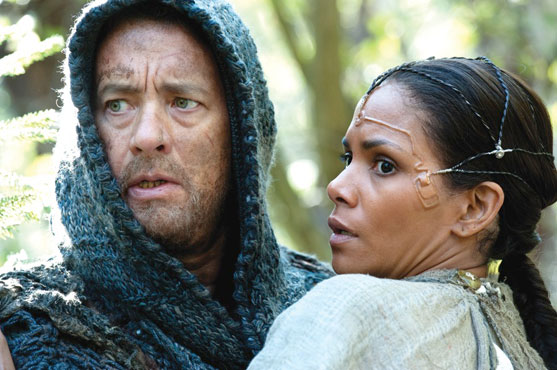If there's anything worth praising in Cloud Atlas, the colossal adaptation of David Mitchell's nesting doll of a novel, it's the spectacle. Directors Tom Tykwer, Andy Wachowski and Lana Wachowski leave no ambition unexplored in their attempt to film an allegedly ''unfilmable'' story, which spans hundreds of years of humanity in the pursuit of a unified theory of life. It is a film with a thousand moving targets, all of them together darting impossibly out of reach.
Yet, Tykwer and the Wachowskis still take aim, as all good windmill-tilters do. Their reward? A heavy-handed, mediocre epic that treats love as foolishly as Crash infamously treated racism -- and, I hope, a cautious admiration for their bold aims. Cloud Atlas tries and fails to be something dramatically different. The film shouldn't be celebrated, but the filmmakers deserve recognition for taking such a risk.

Cloud Atlas: Hanks and Berry
(Photo by Jay Maidment)
Those who have read the novel -- or, more to the point, those familiar with most adaptations of experimental fiction -- should prepare themselves for a severe interpretation of Mitchell's Cloud Atlas. There is little to no subtlety in this film. It follows six storylines of distinct genres: a Pacific travelogue set in 1850, a melodramatic romance in 1931, a whistleblower mystery in 1975, a slapstick comedy set during contemporary times, a dystopian sci-fi adventure in the near future, and post-apocalyptic thriller set centuries later. Here's the gimmick: The characters are different, and while each story injects its own idiosyncratic imagery to the film, the stable of actors remains the same throughout. (The usual suspects, often hidden under heavy makeup and prostheses, include Tom Hanks, Halle Berry, Jim Broadbent, Doona Bae, Hugh Grant, Hugo Weaving, Jim Sturgess and Ben Whishaw.)
At best, the recurring cast adds a much-needed sense of familiarity to Cloud Atlas's touch-and-go visits to each story. (Because the film demands such a wide variety of characters, the Wachowskis and Tykwer also use the opportunity to normalize gender-bending personalities and tinker with the structural concepts of racial identity.) At worst, however, the repeated costume changes resemble what you might see in a particularly resourceful episode of Saturday Night Live. It's difficult to see Hanks, for example, as anyone except Hanks, whether he's playing a British gangster or a cowardly tribesman.
Still, Cloud Atlas has moments when you can't help but let its grandeur consume you. The vigor of its storytelling compels you to focus on the characters, to empathize with their struggles, to marvel at the intricacies of their worlds. The film rarely lingers, if ever; it just keeps feeding new details into each conflict with an unfailing enthusiasm. Stuff just keeps happening. But, inevitably, the illusion shatters and doubt pours in: Why is Tom Hanks wearing false teeth and a putty nose? Is that…Halle Berry pretending to be a white socialite? Why does Hugo Weaving appear to be playing a Beelzebub dandy? In the name of everything that is right and good in the world, does everyone in the future have meticulously waxed eyebrows?
In a different film, these questions could be ignored. The illusion could still survive. Cloud Atlas, however, pushes tension to the point of fatigue. There's rarely dramatic release within each story, so there are few chances to dwell on the consequences of a plot point. (Thankfully, the meta-narrative lets off some steam whenever it revisits Tykwer's surprisingly hilarious story about old folks busting out of an oppressive retirement home. It's easily the best of the six.) As the details blur together in a stream of hyperactive sequences, each scene reveals itself to be a ridiculous stage for actors trapped in the uncanny valley. Because the Wachowskis and Tykwer fall short, Cloud Atlas can seem to be little more than a testing ground for silly accents and intricate makeup work.
The technical failures of the narrative, though, are merely screw-ups compared to the sappy dime-store philosophy Cloud Atlas peddles as its message. The great moral awakening of this film is that love and destiny are intertwined. That's it. The personalities of lovebirds never clash, nor do they ever seem to exhibit themselves as anything but passive agents of their intense desire for one another. The characters lucky enough to be paired together bond like chemical agents, not like people. This is not an honest depiction of love -- it's a wistful longing for spiritual satisfaction.
CLOUD ATLAS
 Starring Tom Hanks, Halle Berry, Hugo Weaving Rated R 164 minutes Opens Friday Area theaters
Starring Tom Hanks, Halle Berry, Hugo Weaving Rated R 164 minutes Opens Friday Area theaters
In one of the film's most cringingly on-the-nose scenes, a newly enlightened character takes a stand against his bigoted stepfather, declaring, ''All boundaries are conventions waiting to be transcended.'' I imagine that a similar belief encouraged the Wachowskis and Tykwer to will Cloud Atlas into existence. But, as much as I admire their ambition, they did not transcend boundaries. They perpetuated an insulting idea about love that ignores the texture and depth of the relationships they revere as supremely important. Their lovers do not fight or hurt each other or make mistakes. They don't change and learn and make themselves better for their partners. They are merely there, hand-in-hand, as wholly satisfied, wholly uninteresting couples. Is that love? No, never.
...more